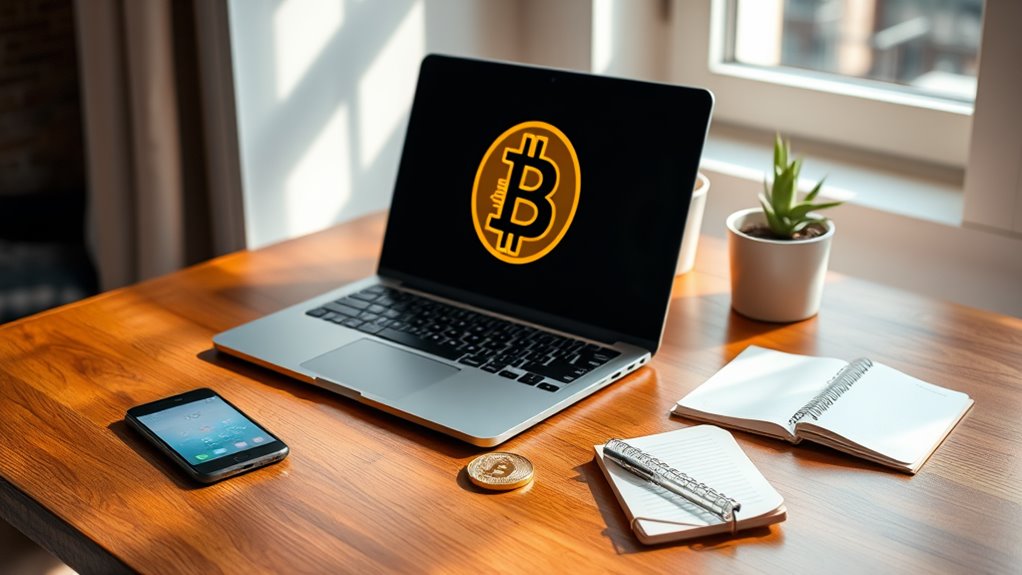
Bitcoin for Beginners: Essential Steps to Get Started
Getting started with Bitcoin requires several key steps. First, understand Bitcoin's decentralized nature and how it eliminates traditional banking intermediaries. Next, create a secure wallet to store your digital assets, ensuring you back up recovery phrases offline. Select a reputable cryptocurrency exchange like Coinbase or Binance with strong security measures. Learn about transaction mechanics, including public and private keys. Finally, develop a long-term investment strategy, such as dollar-cost averaging, to navigate market volatility. These fundamentals establish a solid foundation for cryptocurrency engagement.
Key Takeaways
- Select and set up a secure Bitcoin wallet (software, hardware, or paper) to store your Bitcoin and private keys safely.
- Create strong passwords, enable two-factor authentication, and store recovery phrases offline to protect your Bitcoin investment.
- Choose a reputable cryptocurrency exchange like Coinbase or Binance that offers suitable security measures and educational resources.
- Understand Bitcoin transaction mechanics, including public/private keys, network confirmations, and variable transaction fees.
- Develop a long-term investment strategy using dollar-cost averaging to navigate volatility while minimizing emotional decision-making.
Bitcoin for Beginners: Essential Steps to Get Started

While the world of cryptocurrency may initially seem complex, understanding the fundamentals of Bitcoin represents the first vital step for beginners venturing into digital currency. Bitcoin operates as a decentralized digital currency on blockchain technology, eliminating the need for traditional banking intermediaries.
To begin investing in Bitcoin, newcomers should first establish a secure wallet, choosing between software, hardware, or paper options based on their security needs.
Next, selecting a reputable cryptocurrency exchange with strong security features and reasonable fees is essential. After creating an exchange account, users can fund it and place their first Bitcoin purchase.
Managing risks through education and diversification helps navigate Bitcoin's inherent volatility. Understanding how public and private keys work together to verify ownership and authorize transactions is crucial for secure Bitcoin management. Regular market monitoring and clear record-keeping of transactions will further support informed investment decisions.
What Makes Bitcoin Revolutionary

Now that the fundamentals of Bitcoin have been established, examining what truly sets this digital currency apart reveals its revolutionary nature.
Bitcoin operates without central authority, utilizing blockchain technology to create a decentralized financial system where transactions occur directly between users.
This structure provides unprecedented financial autonomy, allowing individuals to control their assets without intermediaries, resulting in lower transaction costs and increased privacy.
Advanced cryptographic principles guarantee security while maintaining an immutable transaction record.
Bitcoin's unique economic model, featuring a finite supply of 21 million units, offers resilience against inflation, distinguishing it from traditional currencies subject to central bank manipulation.
This limited supply has contributed to its historical appreciation and potential as a store of value.
The immutable ledger system that powers Bitcoin ensures transparency while eliminating the need for trusted third parties in verifying transactions.
Creating Your First Bitcoin Wallet

How does one safely enter the world of Bitcoin ownership? The journey begins with selecting an appropriate wallet based on individual needs.
Entering Bitcoin ownership requires careful selection of a wallet tailored to your personal requirements and security needs.
Bitcoin wallets come in several forms: software wallets for frequent transactions, hardware wallets for secure long-term storage, and paper wallets for physical documentation.
For beginners, the setup process involves installing a wallet application, which automatically generates a Bitcoin address. This public address can be shared to receive funds, while the private key must remain confidential.
Most wallets provide a recovery phrase during setup—this should be securely recorded offline.
When choosing between wallet types, consider security requirements and usage patterns. Non-custodial wallets offer complete control over private keys, while custodial solutions manage keys for users.
Regardless of choice, implementing strong passwords and two-factor authentication enhances protection.
Popular options include mobile wallets that offer convenience for everyday transactions while providing essential security features for newcomers.
Securing Your Digital Assets

Safeguarding Bitcoin and other cryptocurrencies requires a thorough security approach beyond basic wallet setup. Users should implement multiple protection layers to defend against both online threats and physical vulnerabilities.
Cold storage solutions, such as hardware wallets, offer significant protection by keeping private keys offline and inaccessible to hackers.
- Implement two-factor authentication (2FA) for all cryptocurrency accounts and wallets that support it, adding an essential second verification layer beyond passwords.
- Create detailed backups of wallet information, including recovery phrases stored in multiple secure locations, preferably offline.
- Regularly update wallet software to guarantee the latest security patches are installed, protecting against newly discovered vulnerabilities.
Consider implementing multi-signature protection for additional security that requires multiple approvals before transactions can be completed.
Understanding and addressing security vulnerabilities early can prevent devastating losses that might otherwise be unrecoverable due to cryptocurrency's decentralized nature.
Selecting a Trusted Cryptocurrency Exchange

When diving into the world of Bitcoin and cryptocurrencies, choosing the right exchange becomes a critical foundation for a beginner's journey. Several factors deserve careful consideration before making this decision.
Established platforms like Coinbase and Binance offer user-friendly interfaces ideal for newcomers, while providing educational resources to support learning.
Security should be prioritized—exchanges such as Gemini and Kraken implement robust measures including cold storage and real-time monitoring.
Robust security measures like cold storage protect your assets while you focus on building your crypto portfolio.
Fee structures vary greatly, with Coinbase charging between 0.00% to 0.60% depending on transaction type.
Regulatory compliance provides an additional layer of safety, with Kraken standing out for its multi-jurisdictional licensing.
For those interested in diverse cryptocurrencies, Bitmart offers access to over 1,700 different coins.
Mobile accessibility and quality customer support, as provided by platforms like Bybit, further enhance the trading experience.
Many beginners find that exchanges with comprehensive educational resources can significantly reduce the learning curve and help build confidence in their trading decisions.
Executing Your Initial Bitcoin Purchase

Maneuvering your first Bitcoin purchase requires careful preparation and attention to detail. Once an exchange account is funded, investors typically choose between market orders for immediate execution at current prices or limit orders to purchase at a specific price point.
Understanding the fee structure of the chosen platform is essential, as transaction costs can markedly impact overall investment returns.
- Order Selection – Market orders provide speed but may result in price slippage during volatile periods, while limit orders offer price control but may not execute if the market doesn't reach your specified price.
- Security Implementation – Enable two-factor authentication immediately after account creation to protect your investment from unauthorized access.
- Post-Purchase Planning – Determine whether to keep Bitcoin on the exchange or transfer to a secure wallet for long-term storage.
For maximum security with large investments, consider transferring your Bitcoin to cold wallet solutions which store your digital assets offline and provide superior protection against online threats.
Understanding Bitcoin Transaction Mechanics

Every Bitcoin transaction follows a sophisticated yet elegantly designed process that underpins the entire cryptocurrency ecosystem. When a user initiates a transfer, they input the recipient's public address and the amount to send. The transaction is then digitally signed with the sender's private key, authenticating their ownership and permission to transfer the funds.
Once signed, the transaction is broadcast to the Bitcoin network, where it enters a memory pool (mempool) awaiting validation. Miners collect these pending transactions and compete to solve complex cryptographic puzzles.
The first miner to solve the puzzle adds a new block of transactions to the blockchain, receiving Bitcoin as a reward. For security purposes, a transaction is considered confirmed after several additional blocks are added, typically taking about ten minutes per block.
Users should consider transaction fees when sending Bitcoin, as higher fees typically result in faster processing times.
Developing a Long-Term Investment Strategy

As investors venture into the world of cryptocurrency, developing a robust long-term Bitcoin investment strategy becomes essential for maneuvering the volatile market landscape.
Understanding approaches like dollar-cost averaging, where fixed amounts are regularly invested regardless of price fluctuations, can help mitigate the impact of Bitcoin's notorious volatility.
Dollar-cost averaging offers investors a disciplined framework to navigate Bitcoin's volatility while building positions over time.
Considering Bitcoin's capped supply of 21 million coins provides context for its potential scarcity value over time.
- Time horizon matters: Long-term holding typically outperforms frequent trading and reduces the impact of transaction fees.
- Diversification reduces risk: Combining Bitcoin with other assets can protect against cryptocurrency-specific downturns.
- Regulatory awareness is vital: Staying informed about changing government policies helps investors adapt strategies accordingly.
Analysts predict that by 2025, increased institutional adoption will likely stabilize cryptocurrency markets and potentially reduce the extreme price volatility that concerns many new investors.
Frequently Asked Questions
Can Bitcoin Transactions Be Reversed or Canceled?
Bitcoin transactions cannot be reversed or canceled once confirmed. Only unconfirmed transactions may be modified using Replace-By-Fee protocol, but confirmed transactions become immutable entries on the blockchain, requiring recipient's cooperation for returns.
How Does Bitcoin Mining Impact the Environment?
Bitcoin mining has a notable ecological footprint, consuming substantial electricity—comparable to Poland's usage—generating significant carbon emissions and electronic waste. However, increasing renewable energy integration offers potential for reducing its environmental impact.
What Happens to My Bitcoin if I Lose My Wallet Password?
If one loses their wallet password without a recovery phrase, their Bitcoin may be permanently inaccessible in non-custodial wallets. Recovery options include using backup phrases, password recovery tools, or seeking professional assistance services.
Is Bitcoin Legal in All Countries Worldwide?
The Bitcoin constellation shines brightly across most nations, but its light doesn't reach everywhere. Bitcoin is legal in 119 countries, while others like China, Qatar, Nepal, and Egypt have banned or restricted its use.
How Do Bitcoin Inheritance and Estate Planning Work?
Bitcoin inheritance requires meticulous planning due to its digital nature. Owners should document holdings, guarantee proper legal frameworks through wills or trusts, consider multisig wallets, and consult with cryptocurrency-knowledgeable attorneys to facilitate successful asset transfer to beneficiaries.
Conclusion
Bitcoin demands careful attention, proper security measures, and ongoing education. Starting with a secure wallet, selecting a reputable exchange, and making informed purchases creates a foundation for success. Understanding transaction mechanics helps investors navigate the digital landscape effectively. Whether buying for long-term investment or everyday use, Bitcoin offers both opportunities and challenges that reward those who approach this digital frontier with patience and diligence.














